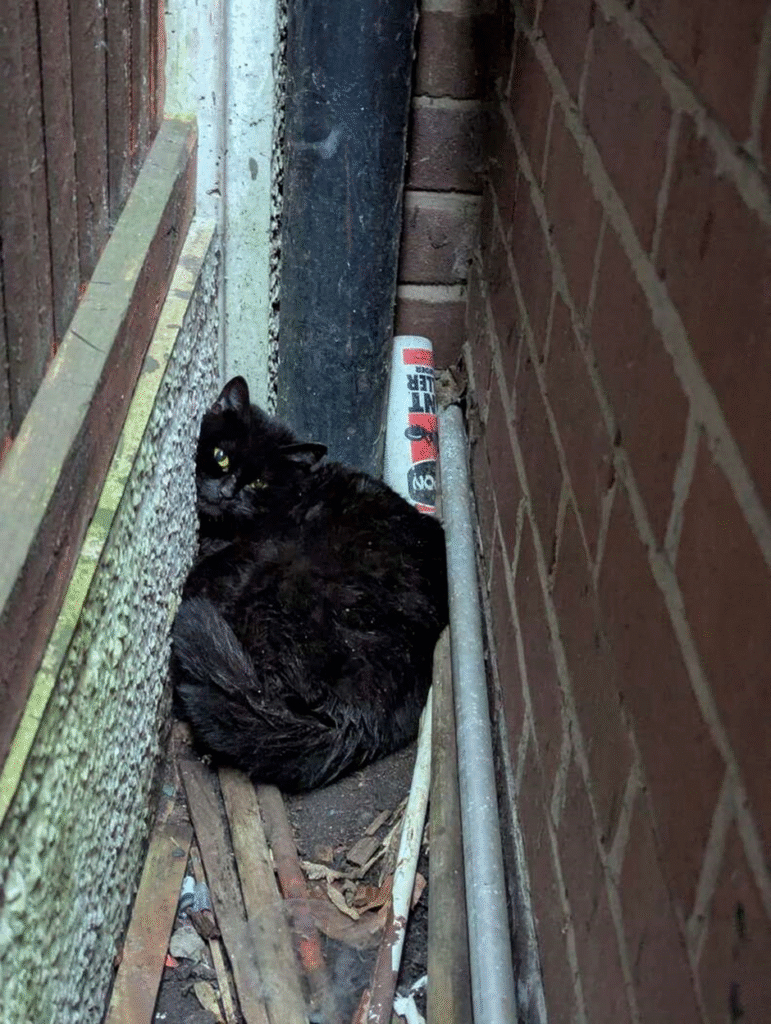Leo had always considered the narrow corridor between his garage and old Mrs. Albright’s wooden garden shed to be the most forgettable stretch of property in the neighborhood. It was barely three feet wide, choked with thorny blackberry vines and dust motes, serving as a repository for discarded lumber and forgotten dreams. It was a place where things went to be silent and unseen.
That’s why, when the raw, persistent sound of desperate distress punctured the mid-morning quiet, Leo knew it was an emergency. It wasn’t the sound of fighting cats; it was a rhythmic, pleading wail, tight with fear and pain, emanating directly from that forgotten passage.
He moved cautiously, pushing aside a tangled mess of ivy. The sight stopped him cold. Wedged between the harsh, unyielding concrete wall of the garage and the splintered, weathered cedar fence of the shed was a cat. She was a beautiful, but clearly ancient, stray, a gorgeous mosaic of a tortoiseshell-calico mix—patches of fiery orange, deep charcoal black, and stark white marbled across her body.

The gap was less than eight inches wide. She hadn’t accidentally fallen in; she had intentionally crawled into the darkest, most secluded space she could find. Now, her body, heavily weighted and awkward, made it impossible to turn around or back out. Her eyes, wide and filled with the wild panic of an animal facing its end, were locked on him.
Leo, who instantly named her Rialto (for the Venetian bridges and canals that were always too narrow), crouched down. Her wail intensified, but it was complex. It wasn’t just a cry of being stuck. It was a rhythmic, insistent sound—a desperate, biological plea.
“You’re stuck, aren’t you, girl?” he murmured, his voice soft against the clamor of the morning traffic. He tried offering his hand hoping to gauge how firmly she was wedged. She recoiled instantly, not out of aggression, but sheer terror.
He realized the severity of the situation immediately. Her flanks were damp, her fur matted, and the meows were draining her strength. He knew if he tried to pull her out, he risked injuring her severely. More importantly, he suspected the true reason for her distress. That narrow, dark crevice had been chosen for one of the most private and vulnerable acts in the animal kingdom.

Lena backed away, his heart pounding with the gravity of the decision he faced. He couldn’t leave her there. The temperatures would soar by midday, and the sun would angle into the gap. His only option was to dismantle the shed wall.
Grabbing a hammer and a pry bar, he started working on the weakest point of the cedar fence—a horizontal rail near the ground. The wood was old and brittle, splintering easily. Each wrench and pull was met with a protesting shriek from Rialto, but Leo worked fast, driven by the desperation in her eyes.
Finally, with a loud crack, an entire panel of the fence gave way, creating an immediate, life-saving opening.
The moment the barrier moved, Rialto didn’t flee. Instead, she collapsed further into the darkness, exposing the secret she had been fiercely guarding. Tucked into a damp, shallow hollow in the dirt, curled against the cool concrete base of the wall, was a tiny, squirming clutch of newborns. She hadn’t been screaming for herself; she had been screaming for help for her children, knowing she was trapped and they were exposed.
There were five of them. They were only hours old, their eyes still sealed shut, their bodies fragile and damp. They were an astonishing menagerie of colors, tiny mottled things that looked like the earth they were born on. One tiny marmalade-and-grey kitten was barely visible, wrapped up in the folds of his mother’s exhausted body.

The rescue shifted from a mechanical effort to a medical mission. Leo gently slipped a thick, soft bath towel under the whole fragile family and lifted them out of the cold dirt and into a large, warm plastic bin he’d lined with multiple layers of fleece.
He brought them inside, settling the improvised sanctuary in a quiet, climate-controlled corner of his spare bedroom. Rialto, exhausted but finally safe, immediately began the meticulous, life-affirming work of motherhood.
The sight of her, now free from the brutal constraint of the wall and the fence, was profound. Her head rested easily on the soft towel, her body stretched out to give access to the five demanding mouths. Gone was the fear, replaced by the profound, heavy-lidded relief of a survivor. She purred—a rumbling, continuous sound that vibrated the entire box—a song of gratitude and fierce ownership.

Leo spent the next few hours simply watching the miracle of the kaleidoscope family. The kittens, once tiny, chilled bundles of fear, were now thriving, nursing rhythmically and securely beneath their mother’s vigilant eye. He gave Rialto warm food and fresh water, which she consumed with a speed that indicated she hadn’t eaten properly in days.
It was an unexpected journey for Leo, the quiet neighbor who usually dealt only with numbers and spreadsheets. He had walked out that morning expecting to clear some yard debris, and instead, he had become the key to a mother’s survival and the gateway to a new life for five impossibly tiny beings.
The fenceline plea was answered. It was a reminder that true courage isn’t always loud or heroic; sometimes, it’s just the desperate meow of a mother cat who knows exactly who to call when her family needs saving. Leo looked at the serene scene, the mother and her children finally at peace, and knew that the forgettable corner of his property had become the site of a profound, unforgettable rescue. He was keeping them all. The kittens, once strong enough, would be named after the tools that freed them: Hammer, Pry, Cedar, and Fleece. And the fifth, the smallest, he would simply call Hope.


